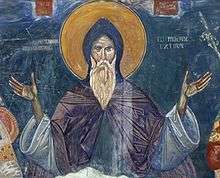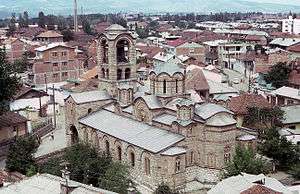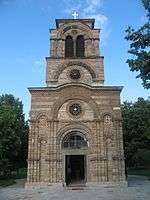Our Lady of Ljeviš
| Our Lady of Ljeviš, Mother of God | |
|---|---|
| Богородица Љевишка | |
|
Overview of the church, 1980 | |
| Coordinates: 42°12′41″N 20°44′09″E / 42.21139°N 20.73583°E | |
| Location | Prizren, Kosovo[a] |
| Denomination | Serbian Orthodox |
| History | |
| Founded | 1306–1307 |
| Founder(s) | Stephen Uroš II Milutin of Serbia |
| Dedication | Theotokos |
| Architecture | |
| Status | Church |
| Functional status | Active |
| Heritage designation |
Monument of Culture of Exceptional Importance |
| Designated | 1990 |
| Style | Serbo-Byzantine style |
| Specifications | |
| Materials | Stone |
| Administration | |
| Diocese | |
| Official name | Medieval Monuments in Kosovo |
| Type | Cultural |
| Criteria | ii, iii, iv |
| Designated | 2004 (28th session) |
| Reference no. | 724 |
| Region | Europe and North America |
| State party | Serbia |
| Extensions | 2006 |
| Type | Monument of Culture of Exceptional Importance |
| Designated | 1947 |
| Reference no. | СК 1369[1] |
Mother of God Ljeviška (Serbian: Богородица Љевишка/Bogorodica Ljeviška, Albanian: Kisha e Shën Premtës) is a 14th-century Serbian Orthodox church in the town of Prizren, located in southern Kosovo. It was converted to a mosque during the Ottoman Empire and then back into a church in the early 20th century.
History
The construction of the church was commissioned in 1306–9 by Serbian King Stefan Milutin.[2] It was built on the site of the ruins of an earlier Byzantine church, whose original name Metera Eleousa was preserved in Slavic as Bogorodica Ljeviška.
In 1990 Serbia designated it a Monument of Culture of Exceptional Importance, and on 13 July 2006, it was placed on UNESCO's World Heritage List as an extension of the Visoki Dečani site (named Medieval Monuments in Kosovo), which, as a whole, was placed on the List of World Heritage in Danger. The Church was guarded by KFOR after June 1999. However, it was heavily damaged by arson during the 2004 unrest in Kosovo. Around 35 Serbian Orthodox churches and monasteries have been destroyed or damaged, usually by arson, including medieval holy sites.[3][4]
A group of experts sponsored by Serbia has visited the church on several occasions to assess the damage, but no concrete steps have been taken. The church is subject to constant looting -- even construction material, specifically lead, have repeatedly been stolen from the roof.[5]
Gallery
 The famous fresco Bathing of the Christ before it was destroyed and burned in 2004.
The famous fresco Bathing of the Christ before it was destroyed and burned in 2004. Bathing of the Christ, after vandalism by a Kosovo Albanian mob during the 2004 unrest in Kosovo.
Bathing of the Christ, after vandalism by a Kosovo Albanian mob during the 2004 unrest in Kosovo. The fresco of King Milutin, Bogorodica Ljeviška
The fresco of King Milutin, Bogorodica Ljeviška Saint Simeon (Stefan Nemanja), fresco from Mother of God Ljeviška.
Saint Simeon (Stefan Nemanja), fresco from Mother of God Ljeviška. Fresco "Communion of Apostles", Bogorodica Ljeviška
Fresco "Communion of Apostles", Bogorodica Ljeviška Stefan Prvovenčani, beginning of the 14th century (1307–1309), fresco from Bogorodica Ljeviška church in Prizren
Stefan Prvovenčani, beginning of the 14th century (1307–1309), fresco from Bogorodica Ljeviška church in Prizren Saint Sava, beginning of the 14th century (1307–1309), fresco from Bogorodica Ljeviška church in Prizren
Saint Sava, beginning of the 14th century (1307–1309), fresco from Bogorodica Ljeviška church in Prizren View of the church in 2010, after repairs
View of the church in 2010, after repairs
Further reading
- Felix Corley and Branko Bjelajac (18 March 2004). "Kosovo and Serbia: Churches & Mosques Destroyed Amid Inter-Ethnic Violence". Forum 18.
Notes and references
^ Kosovo is the subject of a territorial dispute between the Republic of Kosovo and the Republic of Serbia. The Republic of Kosovo unilaterally declared independence on 17 February 2008, but Serbia continues to claim it as part of its own sovereign territory. The two governments began to normalise relations in 2013, as part of the Brussels Agreement. Kosovo has received recognition as an independent state from 110 out of 193 United Nations member states.
- ↑ Monuments of Culture in Serbia: ЦРКВА БОГОРОДИЦЕ ЉЕВИШКЕ (SANU) (Serbian) (English)
- ↑ Curcic, Slobodan (2005). Judson J. Emerick, ed. "Renewed from the Very Foundations": The Question of the Genesis of the Bogorodica Ljeviska in Prizren. Archaeology in architecture: studies in honor of Cecil L. Striker. von Zabern. p. 23. ISBN 9783805334921. Retrieved 26 November 2012.
- ↑ "Prizren, OUR LADY OF LJEVIS (XIV century) - burnt inside (PHOTO: 22.3.2004) - Serbian Orthodox Church [Official web site]".
- ↑ "Eighth anniversary of violence against KiM Serbs / OrthoChristian.Com".
- ↑ "Church roof stolen in Prizren, Bishop Protests". OCP Media Network. 15 April 2011. Retrieved 18 December 2015.
External links
| Wikimedia Commons has media related to Bogorodica Ljeviška. |
Template:Kosovo


